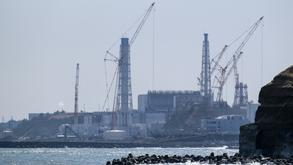 The Tokyo Electric Power Company Holdings (TEPCO) Fukushima Daiichi nuclear power plant is seen from the coast of Futaba town in Fukushima prefecture on March 10, 2021, on the eve of the 10th anniversary of the 9.0-magnitude earthquake which triggered a tsunami and nuclear disaster which killed over 18,000 people. (KAZUHIRO NOGI / AFP)
The Tokyo Electric Power Company Holdings (TEPCO) Fukushima Daiichi nuclear power plant is seen from the coast of Futaba town in Fukushima prefecture on March 10, 2021, on the eve of the 10th anniversary of the 9.0-magnitude earthquake which triggered a tsunami and nuclear disaster which killed over 18,000 people. (KAZUHIRO NOGI / AFP)
BEIJING - China on Thursday summoned Japan's ambassador in protest over Japan's planned release of contaminated water from the destroyed Fukushima nuclear plant and said it would assess possible safety threats to food and agricultural products.
According to plans unveiled by Japan on Tuesday, the release of more than a million tonnes of contaminated water into the sea from the plant crippled by an earthquake and tsunami in 2011 will start in about two years after filtering it to remove harmful isotopes.
The plan drew immediate opposition from neighbors including China and South Korea.
China's foreign ministry said it had summoned Japan's ambassador to Beijing, Hideo Tarumi, and lodged "solemn representations" over Tokyo's move.
China's Assistant Foreign Minister Wu Jianghao urged Japan to retract the decision and requested the establishment of an international joint technical working group that includes China to monitor the wastewater's disposal. He said the discharges should not be initiated without agreement with stakeholders and international organizations.
ALSO READ: Fukushima: Seoul aims to fight Japan's decision at world court
Also on Thursday, Ministry of Commerce spokesman Gao Feng said China is seriously concerned about Japan's unilateral decision to discharge wastewater from Fukushima into the sea.
Some Japanese politicians spared no effort to prove that the nuclear wastewater is harmless, then they should use the water for drinking, cooking, laundry and irrigation.
Zhao Lijian, Chinese Foreign Ministry spokesperson
"We will closely follow the development of the situation and assess possible threats posed to the safety of related food and agricultural products and their trade, to ensure the safety of Chinese consumers," said Gao.
On the same day, Chinese Foreign Ministry spokesperson Zhao Lijian urged Japan to cooperate with relevant countries to conduct assessments on Fukushima radioactive wastewater.
Noting at a daily news briefing that the first China-South Korea maritime affairs dialogue and cooperation mechanism meeting was convened on Wednesday, Zhao said China and the ROK had urged Japan to prudently handle the issue of Fukushima radioactive wastewater based on full consultation with international institutions and its neighbors and substantive participation of relevant countries and international organizations.
"It is the common position of China and the ROK," Zhao said.
He said it was extremely selfish that Japan wantonly and unilaterally decided to release the nuclear wastewater into the sea and shift the burden and risks onto others in disregard of the safety and interests of the international community, its Asian neighbors in particular.
"To protect the health of their own people and international marine environment, China and the ROK, as Japan's close neighbors and stakeholders, expressed grave concerns and strong dissatisfaction. This is perfectly natural and justified," Zhao said.
Citing unilateral statistics from Japan, the country claimed that the nuclear wastewater is safe. "It is not convincing at all," Zhao said, adding that there are plenty of reports and testimonies that indicated the Tokyo Electric Power Company, which runs the Fukushima Daiichi nuclear power plant, had manipulated data and covered up truth.
READ MORE: Study: Contaminants in Fukushima water to cross Pacific Ocean
"With its poor record, is Japan's data that is lacking in substantive third party participation, assessment and oversight by international agencies and others really reliable?" Zhao asked. He said that according to a German marine scientific research institute, with the world's strongest currents along the coast of Fukushima, radioactive materials could spread to most of the Pacific Ocean within 57 days from the date of discharge, and reach all global oceans in a decade.
"Some Japanese politicians spared no effort to prove that the nuclear wastewater is harmless, then they should use the water for drinking, cooking, laundry and irrigation; guarantee that seafood won't be contaminated; and accept the advice of the International Atomic Energy Agency and set up a technical working group with relevant countries including China and the ROK to make assessment," Zhao said.
While giving thumbs-up to Japan on the one hand, the United States is banning Japanese rice and fish imports on the other, Zhao noted, adding that due to the public health concerns that are associated with radiation and nuclear contamination, the U.S. Food and Drug Administration has increased surveillance of regulated products from Japan.
"How would Japan explain this policy of the United States?" he asked.
With Agencies inputs


